Shirab the boy from Baghdad
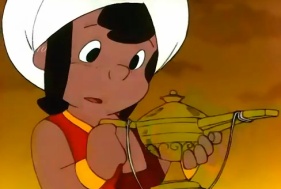
Shirab the boy from Baghdad
ï ¿½ Nippon Animation |
Original title: Arabian Nights Sinbad no Boken
Characters: Shirab, Yasmina, Ali Baba, Ara, Hassan
Author: Shin'ichi Yukimuro
Regia: Fumio Kurokawa
Production: Nippon animation
| Country: Japan
Year: 1st October 1975
Broadcast in Italy: 1981
Gender: Adventure / Fantasy
Episodes: 42
Duration: 24 minutes
Recommended age: Children from 6 to 12 years old | Among the many cartoons of our childhood, there is one that the older ones will remember with affection but which, inexplicably, has been missing from the television schedules since the Eighties, the date of its first and last broadcast. It is "Shirab, the boy from Baghdad" (original title Arabian Nights Sinbad no Boken), a cartoon series (anime in this case) freely inspired by the famous Arab book of fairy tales "The Thousand and One Nights" and produced by Nippon Animation in 1975. It was broadcast in Italy on Rai Uno in 1981 thanks to an accurate dubbing, made by Emi. In the fifty-two episodes that make up the series, the adventures of Shirab, the restless teenage son of an important Baghdad merchant, a rebellious soul always looking for new emotions, are told. Shirab spends her days making trouble and dreaming of running away, but she also loves listening to the fantastic tales of her uncle Alì Hassan who, being the captain of a merchant ship, always manages to narrate many adventures he has personally experienced around the world. It is precisely the uncle who gives the boy, returning from one of his travels, a talking bird which will be given the name Yasmine and which will become Shirab's faithful companion in all subsequent episodes. A sort of wise travel companion, a bit of a mother and a bit of a playmate, who always knows how to say the right thing at the right time, often prompting the reckless young man to think before acting.
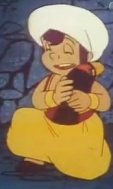
Shirab and Yasmine the talking blackbird
ï ¿½ Nippon Animation | Determined to live the wonderful adventures that up to now he has only heard in numerous stories - pieces of a life that he would like but that others live - Shirab decides, against the advice of his father, to embark with his uncle to start the tour of the world. But the unexpected is just around the corner and not one of those that can be easily solved. The ship they travel on is attacked by a giant whale and the boy and his uncle are shipwrecked on a desert island. Here, having lost his uncle in a daring way, he will have to learn to manage alone, with the only help of Yasmine and her two new friends, Aladdin aka Ara and Ali Babà. A series of incredible adventures will begin, often littered with dangers and difficulties, during which he will meet strange characters, some straight out of Arabian fairy tales, such as the forty thieves or Sherazade, the beautiful and mysterious princess. But there will also be room for sea monsters, mermaids, wizards but also Lilliputians and dragons. And as in any self-respecting Arabian story, Shirab will also find himself dealing with the Genie of the lamp and many flying carpets. But to better understand the story and the plot there is nothing better than watching the first episodes which, immediately, manage to effectively convey the idea of the entire series. What strikes above all else are the colors of the animations. All focused on shades of yellow, orange and ocher, they immediately bring back to the Arab world and overshadow even the rather simple drawings, with a childish trait, which move in jerks on a scene that is not very defined and almost devoid of details. All features that absolutely do not intend to hide the destination of this series, aimed at a very young audience.
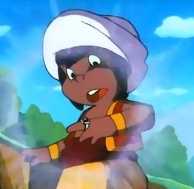
Shirab the boy from Baghdad
ï ¿½ Nippon Animation | The first episodes are all centered on Shirab's relationship with his family, almost entirely devoid of female figures. The father, a one-piece man who dreams of a comfortable and peaceful future for his son similar to his own, cannot accept the idea that the son does not want to follow in his father's footsteps and carry on the business which, among other things , makes them one of the most prominent families in Baghdad. And then there is uncle Ali who, in contrast to his father, is everything Shirab would like to be in life: free, adventurous, with in his eyes that desire to travel and discover what the world can offer, which little Shirab sees. even in his own eyes every time he looks in the mirror. This contrast creates many difficulties for the boy who, basically, loves both his father and his uncle and would like to avoid making one of them suffer. But life puts him in front of a choice and between the affections and the desire for freedom, the latter wins. And so, despite the evident pain of his father, Shirab escapes and embarks with his uncle on a merchant ship, convinced of chasing a thousand adventures that he will be able to tell his father and friends on his return. A new Ulysses of Joice who, hungry for knowledge, cannot help but meet his destiny. In the long run, life on the ship turns out to be less easy than expected. Despite this, the little sailor holds out because the will to live and to experiment is stronger than any suffering. And there is his uncle to support and console him and this closeness prevents Shirab from actually feeling alone. At this point in the story there is a first slight stylistic change in the story, because each episode becomes a story in itself that tells a particular adventure, with a beginning and an end. And here it is all a resume from old legends and Arabian and non-Arabian legends, adapted and revised in detail, to be understood by children who are the specific target audience to which the cartoon is aimed. There is the episode dedicated to the Lilliputians with Shirab remaking what had been the part of Gulliver. But in the adventures of the sailor, and of the crew of his ship, there are also clashes with sea monsters and dream encounters with bewitching sirens (with again some references to classical mythology with the events of Ulysses) until the arrival of that event that in all children's fairy tales comes to break the monotony of the story and shuffle the cards on the table and then, perhaps, put everything back in its place. A white whale (who doesn't remember Pinocchio?) That will unleash a series of events that will mark a further break in the story: you change pace and the events follow one another, with a different style, with more speed.
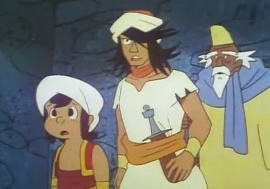
Shirab, Ara and Ali Babà
ï ¿½ Nippon Animation | To change most of all is the protagonist. In fact, the figure of Shirab undergoes a kind of growth. The shipwreck caused by the attack of the whale, therefore, "throws" the shipwrecked sailors on an apparently deserted island, but which in reality hides a thousand pitfalls. Here Shirab is forcibly separated from his uncle and it will be a sort of cathartic separation. In fact, after this tear he will have to learn to get by on his own, not without difficulty. But it will be a painful growth as, even in real life, the development process is always The figure of Yasmine, then, is somewhat reminiscent of what in European fairy tales - and in particular Italian - is the talking cricket. Shirab therefore grows, matures, becomes a man (always respecting what are, however, the canons of children's stories) but continues to live fantastic adventures that, in fact, adapt to his new condition as a boy who has to look after himself. . It is in this second part of the series that the adventures become more "adult" even if the features of the drawings continue to maintain that childhood typical of the cartoon. And so Shirab meets the forty thieves and Sherazade, but often historical characters have only the name and nothing that recalls the original Arab story. Didn't we start by saying that the cartoon is very loosely based on "One Thousand and One Nights"?
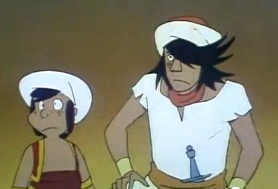
Shirab the boy from Baghdad
ï ¿½ Nippon Animation | Among the various characters who appear on the scene from time to time, two in particular are important in the plot of the story and, coincidentally, appear in this second moment of the story. They are the two little friends that Shirab meets on the island and who will keep him company in difficult times and in the most joyful ones. Also in this case, the two characters respect a little what is the game of parts and are a concentrate of stereotypes and well-defined characters without nuances to be easily recognized - and understood - by the public of the little ones. In the intentions of the scriptwriters, there is always a need for something reassuring and in this case the part of safety is covered by Ari and Ali who also respect traditions in their names.
But let's continue with our story. Despite the many adventures lived, which are what Shirab dreamed of before leaving, his thoughts always go to his father and uncle. What will his old parent do in Baghdad? And what happened to the uncle? Will she be able to find it? In the end, the happy ending is a must. All the events will have their happy ending, which, however, we do not reveal so as not to spoil the surprise for those who have never followed the cartoon. "Shirab, the boy from Baghdad", despite the simplicity of the story told, however, has its own charm and contains some surprises. Among the curiosities to report, there is the name of the protagonist who has undergone a nice transformation. In the original version, in fact, the boy's name was Sinbad, but due to copyright issues in the Italian version, at the time of translation, it was changed to Shirab. Name that also preserves in the initials. The series, which as we have already said is mainly aimed at an audience of very young spectators, is treated in detail a little below average compared to the standards of the time (the series was broadcast in Italy for the first time. XNUMXs). Overall, moreover, the subject does not seem particularly original and the stories are largely taken from old historical tales and fairy tales, albeit with a certain adaptation. There is very little really new and created ad hoc. From the series was then taken an extensive merchandising made up of books, comics, stickers and much more. Although at the time the series received a lot of interest, inexplicably the episodes of the cartoon have never been revived in more recent years, perhaps because - unlike other cartoons - it is considered for young modern viewers too naive in history and enough simple even in the drawings that are not on the same level as another famous Nippon Animation cartoon, L 'ape Maia.
Shirab the boy from Baghdad represents an ideal way that no longer exists even in modern cartoons, a world in which the good guys are really good - and ultimately winners - and the bad guys are all the way through and with no possibility of redemption. A vintage product that expresses the values of that era and that society and is worth following, if only because the viewer will not be afraid of being faced with unpleasant surprises. The plot has already been seen and lived, but who says that the twist is always necessary to be able to fully enjoy a cartoon of other times? Shirab the Boy from Baghdad copyright Nippon Animation and rights holders. they are used here for cognitive and informative purposes.
|

